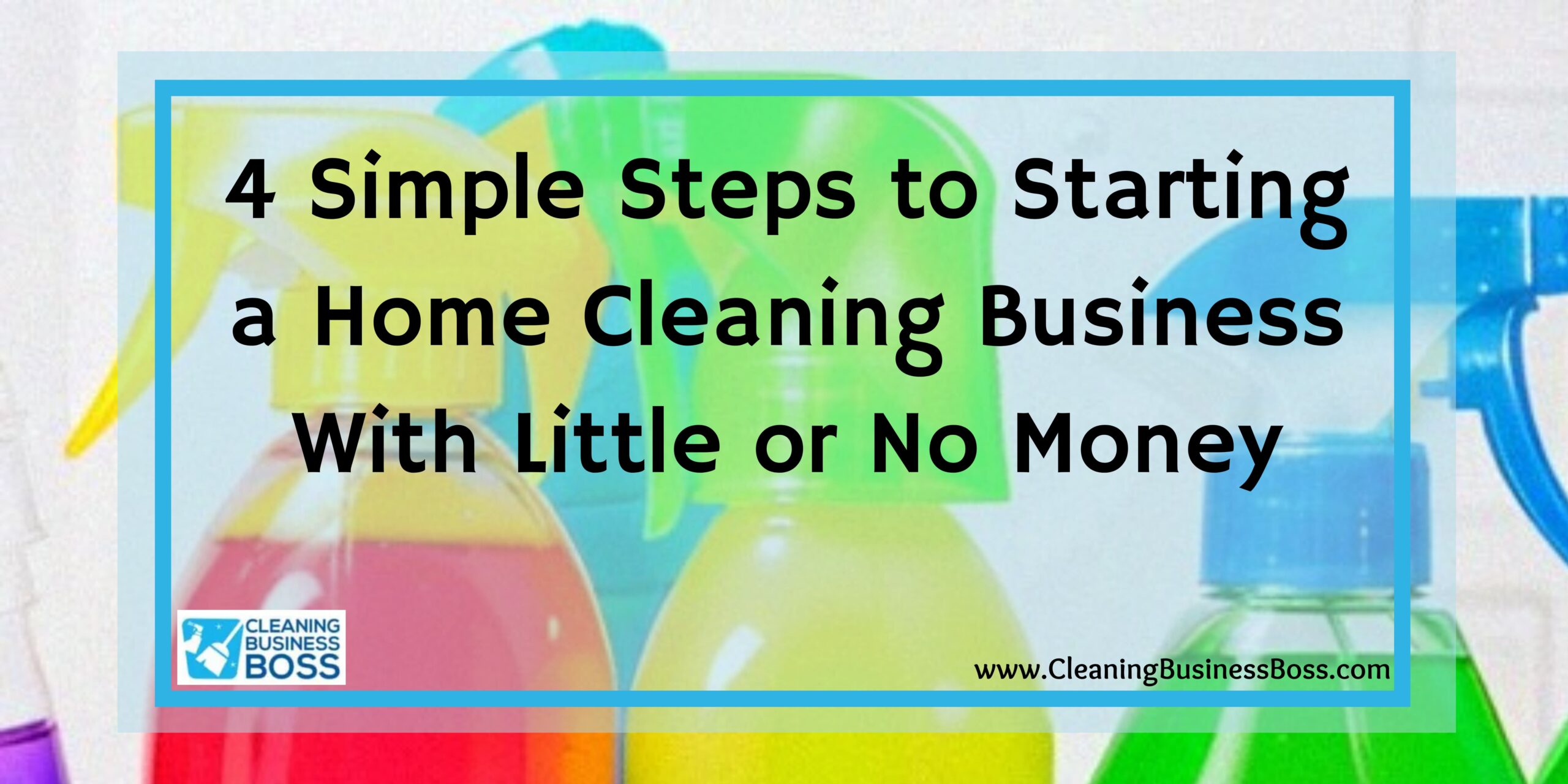Making the transition from working for someone else to becoming your own boss requires careful fiscal maneuvering. The old saying is true: “It takes money to make money.” You don’t have to be a millionaire to get going, though. You just need a financial plan you can act upon with confidence.
Since there are multiple options for funding, we’ve compiled 4 simple steps to starting a home cleaning business with little or no money:
- Acquire funding up-front.
- Set up a business banking account.
- Obtain all the proper licenses and certifications.
- Start marketing your services to the right people.
Acquire Funding Up-Front
Since you can’t just show up to someone’s house and ask if you can start cleaning for them with their own vacuum cleaner, Windex and paper towels, you need to put yourself in a position to make a great first impression. It will benefit your business if you invest in a professional uniform, a presentable vehicle, and a full array of supplies and equipment that shows you’re prepared for any cleaning job.
In order to do that, you need a few bucks to spend first. Here are three ways we recommend going about getting that necessary funding:
Apply for a small business loan

This is the most common way for small businesses, in general, to get started, and it’s an easy way for cleaning companies to make sure they have everything they need upfront without running out of funds. The only thing is you better have a credit score of at least 685 to be considered.
Here are the steps to applying for a small business loan:
- Check your credit score.
- Choose a type of small business loan that works for you
- Find a lender
- Gather the necessary paperwork and fill out an application
- Fill out a couple of accompanying forms.
Yes, it’s a lot of work but this is potentially thousands to tens of thousands of dollars you’re asking a bank to lend you. They are the ones that set the credit limit.
Now, when it comes to picking a lender, you want to consider the following things:
- The amount you can borrow
- Interest rate
- If there’s a down payment on the loan
- The lender’s history/reputation for helping small businesses
- Collateral policies
There are hundreds of banks out there. Here’s a breakdown of the top five banks for acquiring small business loans.
Once you find a lender, there is a long list of paperwork to have with you. You may want to do this in person, instead of online, so you have an expert banker guiding you through the process.
Here’s the list of items a bank will want to see:
- Proof of ownership
- Business licenses (and leases, if applicable)
- A business plan
- How much your business wants to borrow
- A detailed list of how your business plans to use the funds
- Financial projections for the next one to three years
- A financial statement
- Two years of personal tax returns from each owner
- Personal financial statements for each business owner
- Resumes of each owner
Steps five and six are all one step, but we broke them down into two parts to make this more manageable to visualize in your head. The borrower information, personal financial statement, and statement of personal history are all forms. Lastly, there is a fee disclosure form. Finder.com carefully explains each form without making it complicated.
Check out this article to know how to start a cleaning business in eleven steps.
Get an investment partner
Applying for a bank loan looks awfully daunting. It’s not; it’s more time consuming than anything. The upside is you’re borrowing money from a reputable source and it’s all business. The downside is it’s still debt. Another option is to get an investment partner.
Investors give you money with the anticipation that they will make it back, and then some, once you’re making money, too. Investors can come with perks, too, like having connections to get the word out about your cleaning business.
Not sure where to find an investor who specializes in cleaning businesses? Contact the Small Business Administration for some help or hire a capital broker.
The downside to reaching out to investors for financial help is that you give up a percentage of your ownership of your company. However, you can buy out your investors down the line if you want exclusive ownership of your company. The upside is, even if your company fails, you’re not in financial debt to investors.
Save up and cashflow liquid assets

Most advice will encourage you to go into debt to put you in a position to make money. Can you hear how absurd that sounds? People are telling you to spend money you don’t have and take a gamble on making it all back, and then some, just to get ahead. Who does this bit of advice benefit the most?
Hint: Not the borrower.
One of the most underrated–yet least risky–methods of getting a business going is to save up cash for initial costs. Debt is the method we rely on when we don’t want to be patient. However, if you can build the discipline and implement a budget before you’re running a company, then you’re practicing financial skills that lead to success.
The other upside is that you’re living within your means no matter your income source. If your company succeeds, then you keep building momentum without having to play catchup on bank loans or worrying about repaying your investors. Even if the worst happens and your company flops, you can pack up and move on without worrying about how you’re going to repay a mound of debt.
Whether you build a savings or go into debt to get your cleaning business rolling is up to you and what you think is the best path.
Advice to Be Wary Of
To set yourself up for success, you want to avoid setting yourself up for a fiscal disaster. There are two pieces of advice floating around out there we’d like you to consider only as a last resort.
Throw all the upfront costs onto credit cards
According to the Federal Reserve, Americans owe a record $1.04 trillion in credit card debt. Bank loans are one thing. The balance is in one spot and you have only one payment to juggle to square it away. Credit cards, however, like to multiply.
Unless you 100% trust yourself to keep your credit card debt under control, don’t use them. Don’t put yourself in a position where you’re trying to pay off seven at a time, or just opening one card after another to roll the balance around. That’s stress you don’t need, financial trouble you don’t need. It’s too easy to swipe a piece of plastic or use the “Buy It Now” button and fall into the trap of worrying about paying for it later.
You will pay for it, and the interest that comes with it. In other words: you’ll make this more expensive than it should be.
Ask friends and family for loans
“The debtor is a slave to the lender.” Even with good intentions, borrowing from friends and family is a recipe for ruined relationships, isolation and alienation.
Picture a scenario where you meet face-to-face with a family member to whom you owe thousands and you have no idea how or when you’re going to pay them back. How happy are you both going to be to see each other? Would you even see each other, or would you go out of your way to avoid this person and the awkwardness that would ensue?
Unless you’re both willing to put it in writing and behave like adults, even if the worst happens, don’t take money from people you know. Let them remain your friends and family, not your personal debt collectors.
Set up a business banking account.
Once you know where your initial funds are going to come from, you need to set up a business banking account. It’s illegal to mix business and personal finances, so make a trip to a bank that matches your small business needs.
Business accounts are inexpensive. They can even be free at some branches if you maintain a minimum balance. You can open one online or in person, whichever is easier for you. The SBA has a great breakdown of the documentation you need based on the type of business you have.
Tip: While things are small and simple, you can probably handle all the finances yourself. However, as you grow, an accountant is well worth the investment and never having the IRS breathing down your neck. Hire an accountant immediately if managing all that legal and taxes stuff from day one sounds like a job best suited for professional delegation.
Check out some of the cleaning businesses in USA and learn from them by visiting our article here.
Obtain all the proper licenses and certifications.
Once you have money and a business bank account in place, you can start paying for all the necessary licenses and certifications you need before you take on your first client:
- Vendor’s license
- Sales Tax Certificate
- Fire permit (maybe)
- Air and Water Pollution Control Permit (maybe)
We wrote this blog post on all the licenses and certifications you need. Ultimately, it’s up to your state and town you do business in that decides what licenses and permits to operate legally.
Start marketing your services to the right people.

Unless you have an amazing social group that knows a lot of people who’d love to start giving you business from the start, you’re going to have to spend a few bucks to get the first bite.
Places to advertise your cleaning business:
- Public notice boards
- Newspapers
- Social media
- Facebook ads
- Yelp
- Postal service (mailers)
You can find public notice boards in grocery stores, community centers, and other locations your target clientele frequent. Heck, even golf courses are a good place to try.
Facebook ads are good for targeting locations and narrowing down demographics to match the people who want your services.
Newspapers and mailers are a great way if you wish to get blanket coverage of an area and give people something the can hold, along with a promotional coupon.
Pro tip: Refer-a-friend programs work well in the cleaning business. It incentivizes new and existing clients to spread the word about you while getting something for it in return.
Frequently Asked Questions
Now that you know the pros and cons of multiple ways to start up your cleaning business, and how to intelligently allocate those funds, here are a pair of follow-up questions:
How much does it typically cost to start up a cleaning business?
According to Profitable Venture, “In 2016, for every $1.00 spent on wages, industry operators will typically only spend $0.017 on capital investment. Capital intensity is roughly the same from 2010 through 2015.”
Please note: there is a shift in the industry to use greener cleaning products, so be ready to stay with or get ahead of the curve financially.
Anyway, here’s some quick math for you if this business is a solo venture:
- Total registration fees: $750
- Licenses and permits: $30 to $600
- Insurances: $500 to $2,500
- Supplies & Equipment: $300 to $5,000
- Website: Free to $600
- Total: $1,600-$15,000
It really depends on how many employees you have, if you need a company vehicle, major pieces of equipment, rent an office, marketing plan, etc. You don’t have to go into massive debt to start vacuuming and mopping. You just have to have to know exactly what you need to start landing clients.
How do I pick a small business loan that works for me?
Thankfully, picking the right small business loan isn’t rocket science. There are just five things to take into consideration when picking a loan:
- How much you need
- When you need it
- The reason for borrowing
- How long you’ve been in business
- What collateral your lender can hold against your loan
The size of the loan matters. Some banks only want to work with big loans because that means big profits. Small loans just aren’t worth their time.
When you need it matters because some are paid out to you in installments. Others will do lump sums.
The why matters to the banker as much as it does you. Banks need to weigh risk-versus-benefit. If you can’t paint a clear picture of how they’ll get their money back, chances are you’ll be turned away.
Don’t be discouraged that you haven’t been in business yet. That’s where your personal credit score and projected business plans come in handy.
If you own property or equipment, or if you have other types of equity, you can use this in your favor to get approved for a loan.
To learn more on how to start your own cleaning business, check out my startup documents here.
Please note that the contents of this blog are for informational and entertainment purposes only and should not be construed as legal advice. Any action taken based on the information provided in this blog is solely at your own risk. Additionally, all images used in this blog are generated under the CC0 license of Creative Commons, which means they are free to use for any purpose without attribution.

About the author. Entrepreneur and Cleaning Business Fan.
Hi! I am Shawn and I am a happy individual who happens to be an entrepreneur. I have owned several types of businesses in my life from a coffee shop to an import and export business to an online review business plus a few more and now I create online cleaning business resources for those interested in starting new ventures. It’s demanding work but I love it. I do it for those passionate about their business and their goals. That’s why when I meet a cleaning business owner, I see myself. I know how hard the struggle is to retain clients, find good employees and keep the business growing all while trying to stay competitive.
That’s why I created Cleaning Business Boss: I want to help cleaning business owners like you build a thriving business that brings you endless joy and supports your ideal lifestyle.


2 thoughts on “4 Simple Steps to Starting a Home Cleaning Business With Little or No Money”